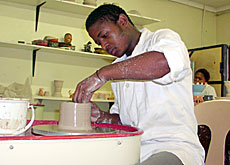
Lessons for a lost generation

With around two-thirds of young South African blacks out of work, a Swiss project is helping many learn the skills they need to join the workforce.
More than 1500 young people – many from the country’s most deprived townships – have been taught a trade since the initiative was set up 18 months ago.
At a conference in Bern this week, project manager of the Swiss-South African Cooperation Initiative (SSACI), Ken Duncan, said nearly SFr4 million had so far been spent on sponsoring a total of 26 projects across South Africa.
Funded jointly by the Swiss Agency for Development and Cooperation (SDC) and Swiss business, SSACI provides young South Africans, deprived of a decent education by apartheid, with vocational training and life skills courses.
Initiatives which have already received funding include schemes to give young people the necessary skills to become carpenters, dressmakers, artists and tour guides.
Getting started
“The initiative came about when we started a dialogue with Swiss companies and their subsidiaries in South Africa about some kind of joint development project,” Duncan told swissinfo.
Two years ago, the companies involved – including Swiss banking giants, Credit Suisse and UBS, pharmaceutical company, Novartis, and Schindler Lifts – signed up to a trust which was jointly funded by the SDC.
Ten corporate donors pledged a total of SFr1 million annually for five years, while the SDC offered to match the sum pledged by the companies franc for franc.
Duncan says the focus of the trust is on the promotion of vocational and technical training for disadvantaged young South Africans.
“We look for projects which provide both training and job creation components,” he explains.
High unemployment
SSACI estimates that the unemployment rate in South Africa currently hovers around 30-40 per cent, but those in charge of selecting and coordinating the projects say the jobless figure among young people is even higher.
“When you look specifically at young black South Africans, you find that unemployment runs at about 70 per cent, so there’s a tremendous need to find jobs for those young people,” Duncan says.
“And one of the greatest obstacles they face is a lack of technical and vocational skills, so there is a great demand for these kind of projects,” he adds.
Many of the projects are small, locally-run schemes which can only offer training to a limited number of participants.
Typical project
Soweto – a vast, sprawling township next to the country’s financial capital, Johannesburg – is home to one of the SSACI-sponsored projects.
Officially called the Siyavuka Lateral Improvement Foundation, the project helps some 30 young ceramics students aged between 18 and 26, teaching them technical skills as well as offering advice on how to go about setting up in business on their own once they complete the course.
Martin Mathole, director of the project and a professional ceramicist and designer by trade, says the SSACI sponsorship has enabled him to give young people the chance to learn new skills.
“I wanted to give something back to the community and to young people, because there is a major shortage of skills in South Africa,” Mathole told swissinfo.
“The aim is to see young people build up enough skills in ceramics to be able to make a living out of it… so we teach them things such as how to draft a business plan, and how to get a loan to start a business.”
Life skills
Mathole – whose one-year course is heavily oversubscribed – says that without such life skills training, those who have enrolled on the training programme would be living on the streets.
“One student, for example, was doing drugs,” explains Mathole. “But now he has changed, he knows where he is going from here. He didn’t know he was at all creative or that he could make a living from his talent.
“Now he knows he has the ability to create and to market himself. He told me, ‘The doors are open to me, I can talk for myself, I’m going to make it’.”
As SSACI coordinator, Duncan spends much of his time visiting those projects which have already received funding as well as assessing others seeking sponsorship.
He admits that SSACI’s limited resources mean the trust can only help a tiny minority of worthwhile projects.
“Obviously we can’t tackle all the problems…and I doubt that the need for this kind of funding will ever go away,” Duncan says.
swissinfo, Ramsey Zarifeh
The Swiss-South African Cooperation Initiative was set up in February 2001 and sponsors life skills projects for young, unemployed South Africans.
Ten Swiss companies have pledged a total of SFr1 million annually for five years, a sum of money matched by the Swiss Agency for Development and Cooperation.
The aim of the initiative is to help alleviate poverty and promote youth development in a country where the unemployment rate is around 30-40 per cent.

In compliance with the JTI standards
More: SWI swissinfo.ch certified by the Journalism Trust Initiative


























You can find an overview of ongoing debates with our journalists here . Please join us!
If you want to start a conversation about a topic raised in this article or want to report factual errors, email us at english@swissinfo.ch.